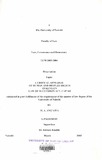| dc.description.abstract | Human rights have gained a significant foothold in many countries in recent years. More
and more human rights norms are taking the forefront on aspect of good governance and
democracy and accountability by states. Its importance emerged after the world war II
when governments came together to affirm that disputes against nations would not be
settled through war but by peaceful means. It was in 1948 when the Universal
Declaration of Human Rights strongly emerged. This declaration recognized the
Inherent dignity and of the equal and inalienable rights of all members of
the human family, thus making it the foundation of freedom, justice and
peace in the world. I
Human rights can therefore be said to be
That right which belongs to any individual as a consequence of being
human, independent of any act of law" "every human being simply
because he or she is a human being is entitled to something.i
Since 1948, human rights have been evolving. The internationally recognized human
rights have now been identified as the three generations of human rights, namely:
• Civil and political rights
• Economic, social and cultural rights
• The "new" or "third generations" human rights (e.g. right to peace
development or environment.' | en |

